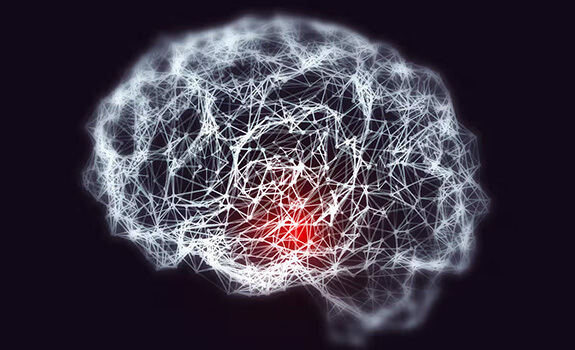January 2, 2025
Beyond Amyloid: The Science That Could Change the Course of Alzheimer’s Disease

Dr. Dale Bredesen spoke to Terry and Joe Graedon, hosts of the podcast “The People’s Pharmacy,” and discussed the factors that affect cognitive decline and the discoveries that have changed the goal of removing amyloid from the brain, to successful treatments that address the underlying causes of dementia. Read the full article and listen to the interview below.
Changing the Course of Alzheimer’s Disease:
This week, we look at the new pharmaceuticals that the FDA has approved for treating Alzheimer disease. Although they are effective at removing amyloid plaques from the brain, they don’t seem to help patients function better. Is it time to turn away from an exclusive focus on amyloid to consider other factors that might affect cognitive decline and change the course of Alzheimer disease?
Even though pharmaceutical firms have spent billions of dollars developing drugs to reduce amyloid in the brain, they haven’t changed the course of Alzheimer disease. Perhaps we need to be looking beyond amyloid at other risk factors. Dr. Dale Bredesen says he and his colleagues have identified more than 36 risk factors. He asserts that when these these are addressed, people can slow or sometimes even reverse their cognitive decline. According to Dr. Bredesen, Alzheimer disease is multi-factorial and it needs a multi-pronged approach.
Considering Physiology Instead of Pathology:
The plaques and tangles that are characteristic of the brain disease first identified by Alois Alzheimer more than 100 years ago only show up in pathology slides. Past studies have hinted that some individuals who have plaques or tangles in their brains don’t have serious cognitive difficulties. Dr. Bredesen urges us to look beyond amyloid pathology and use a physiology lens. What are the main drivers of problems?
Energetics:
Our bodies need to make, use and transfer energy efficiently. That involves the mitochondria, the energy factories within the cells. Nutrition is also critical here, as missing vitamins can block appropriate metabolism. The cardiovascular system is also crucial for the transfer of energy within the body and to the brain. Sleep apnea, which interferes with oxygen uptake overnight, is another big culprit.
Inflammation:
Inflammation in the brain or even elsewhere in the body puts a huge strain on the neurons. Identifying and removing the sources of inflammation is important in treating someone struggling with cognitive problems. Where is the inflammation coming from? It might be an infection. Treatment can make a difference there. It might be dietary, in part. Changing the diet could change the course of Alzheimer disease. Wouldn’t that be worth the effort?
Toxicity:
Heavy metals such as lead or mercury are definitely neurotoxic. However, other substances can also put neurons at risk. Toxins produced by mold are common and very difficult to treat.
Additional Factors to Consider:
There are at least three additional categories that should be considered. Do we have the essential ingredients to create the neurotransmitters we need? One example would be choline for acetylcholine, an essential neurotransmitter that may be in short supply in Alzheimer disease. Most American diets are not rich in choline. Second, how are the neurotrophins doing? These are substances such as BDNF, brain-derived neurotrophic factor. It supports the growth and differentiation of neurons. Third, and possibly most common, is chronic stress. Occasional acute stress is expected and shouldn’t be considered harmful. But chronic stress can damage neurons and make it harder to think even if your neurons are not damaged. High cortisol levels are associated with brain atrophy, which is a clear indication of damage.
Fixing the Leaks:
Dr. Bredesen uses a metaphor of the brain as a house with a leaky roof. If you have a lot of places where the roof leaks, you need to fix all of them to stay dry. But your roof may leak in different places from your neighbor’s roof. Finding the weaknesses and addressing them with personalized medicine is key to changing the course of Alzheimer disease, in Dr. Bredesen’s opinion. It may require attention to diet, exercise, sleep (with adequate oxygen saturation), stress management, brain training, detoxification and possibly supplements such as omega-3 fats or vitamin D. You can learn more from his books and his recent publication in Biomedicines (Aug. 6, 2024).
This Week’s Guest:
Dale Bredesen, M.D., is an internationally recognized expert in aging and neurodegenerative diseases. He is the Senior Director of Precision Brain Health at Pacific Neuroscience Institute, Chief Science Officer for Apollo Health, and former Professor of Molecular and Medical Pharmacology at UCLA. Dr. Bredesen is also the founding President and CEO of the Buck Institute for Research on Aging and the Co-founder of MPI Cognition. Dr. Bredesen is the author of the New York Time’s best seller The End of Alzheimer’s: The First Program to Prevent and Reverse Cognitive Decline and The First Survivors of Alzheimer’s: How Patients Recovered Life and Hope in Their Own Words.



